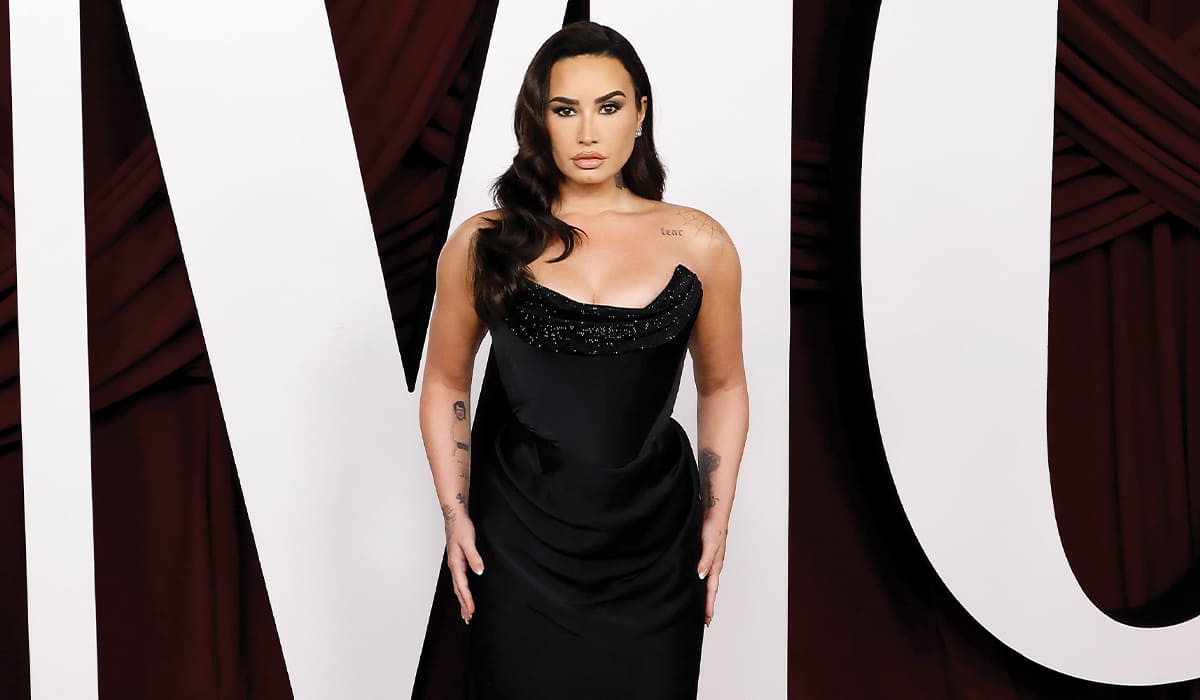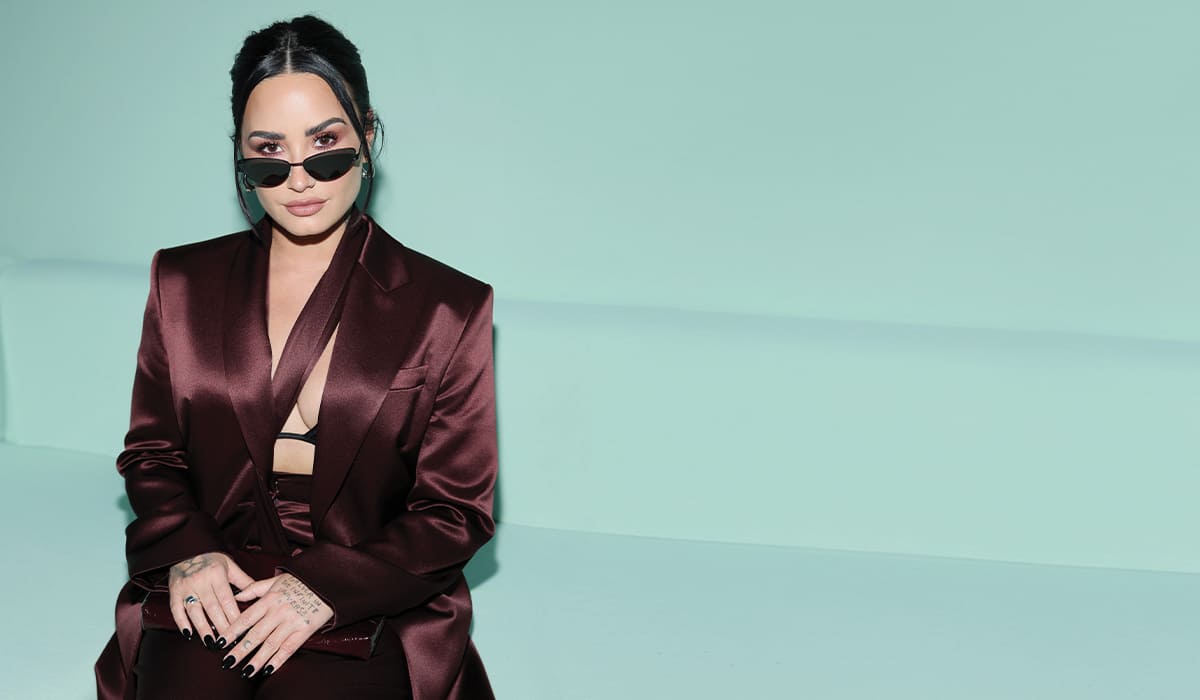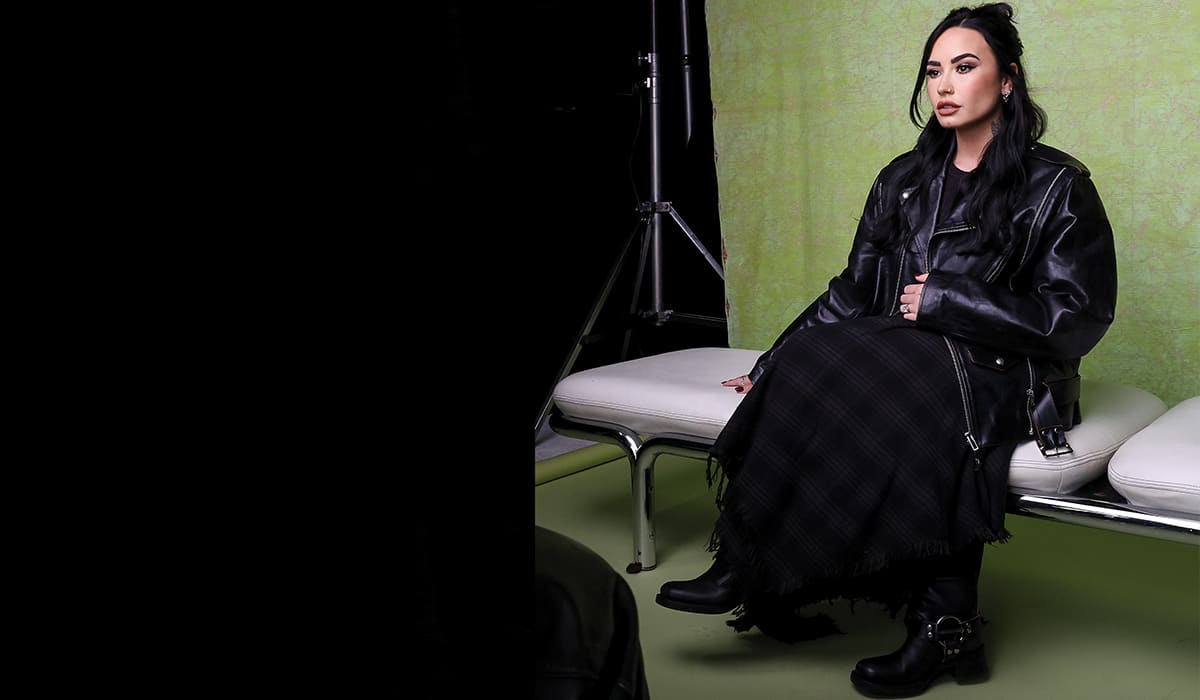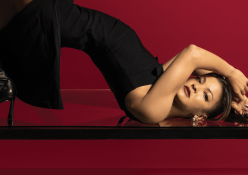From pop princess to powerhouse, she’s not just revisiting the past — she’s revamping it.
I remember the very first time I connected with a Demi Lovato song. Watching Camp Rock (2008), I broke out in song as quirky Mitchie belted out the lyrics, “I’m exactly where I’m supposed to be now / Gonna let the light shine on me.” It was a whole vibe; the Disney era I’ll never forget. And just like me, so many other rebellious, misunderstood teens around the globe have resonated with Demi ever since.
She has never been one to play by the rules — not in music, not in fashion, and certainly not in life. As a bright-eyed child star, she quickly rose to fame in the early 2000s and her journey has been anything but linear. Behind the red carpets and platinum records lies a story of resilience: a battle with identity, mental health and the pressure of growing up under an unforgiving spotlight.
Now, with a bold new sound, a fearless sense of style and a mission rooted in advocacy, Demi is not just reclaiming her narrative — she’s redefining what it means to be a modern icon.

Beautifully flawed
She introduced herself to the world with a dazzling smile on Barney & Friends (2002, age 10) and soon became one of Disney’s biggest stars through projects like Princess Protection Program and the TV series Sonny With a Chance. But behind the bubbly facade was a girl navigating fame, addiction and a deep identity struggle.
“I was filled with gratitude, and there was this sense of wonder and excitement. It was very much the honeymoon phase of my career, right before the train got moving in a way where I couldn’t pump the brakes: she told The Hollywood Reporter. “At Disney, you became this instant role model, whether you liked it or not… And because the Disney Channel was so big at the time, there was also this unspoken pressure that if you did make a mistake, you knew that there were thousands of people just waiting to take your spot.”
Growing up in front of millions was a lot of pressure for the award-winning singer, and eventually she ended up developing unhealthy coping mechanisms (alcohol and drugs) while on tour and managing intense production schedules. It wasn’t long before she was in and out of rehab.
Demi’s 2021 docuseries, Dancing with the Devil, gave fans an inside look at the raw truth behind the publicly documented overdose that nearly took her life in 2018. [She had been sober for six years but relapsed.] It was reported that she nearly died in hospital after suffering several strokes and a heart attack.
“The doctors told me that I had five to 10 minutes and … like, if no one had found me, then I wouldn’t be here: she said on CBS Sunday Morning. “And I’m grateful that I’m sitting here today. I didn’t control any of my life at that period of time. But, yes, I needed to grow up and take control.”
Today, six years into her regained sobriety, Demi is more grounded and present, and she’s telling her story on her terms — with honesty, grit and a voice stronger than ever. This is why she was so passionate about bringing Hulu’s Child Star documentary film to fruition — a project which revealed the experiences of some of the most well-known, like Raven-Symone, Drew Barrymore and Christina Ricci, showing all the highs and lows of growing up in the spotlight.

Warrior woman
“It’s going to be okay. No matter how hard your rock bottom is, you can rise above it and you can come back,” Demi always encourages her fans online.
Post-recovery, Demi’s transformation wasn’t just emotional — it was physical and spiritual. With her signature candour, she’s opened up about embracing her body after years of disordered eating and criticism from the industry.
She has a treatment team — a nutritionist and a therapist that specialises in eating disorders — that she works with; she told Billboard recently she’s been in recovery from bulimia for five, going on six, years now
“I’m trying to learn body acceptance rather than body positivity, because body positivity feels like, ‘I can’t even reach that yet: The main thing that I’m working on is just body acceptance, and looking in the mirror and being like, `This body is strong… This body fought for my life when I overdosed. This body is a miracle:”
Demi approaches health holistically, making sure her diet contains whole foods and no refined sugars, and embracing physical activity.
“I work out six days a week and I take Sundays off,” she told PopSugar. “Several days I’ll do an hour of cardio, and several days a week I’ll do an hour of strength training. On top of that, some days I’ll work out for two hours where I’ll do an hour of cardio and an hour of MMA, or I’ll do an hour of strength training and an hour of MMA — but I don’t do that every day!”
Her favourite workout is jiu-jitsu, a Brazilian martial art that embraces unarmed, close-contact defence. When you’re rolling with somebody, you’re constantly thinking of defending or attacking moves, so it’s kind of meditative in a way. But it’s also a great workout when you’re training — when you’re really moving around with somebody; she says.
For Demi, strong looks different on everybody, and she’s channeling that strength into music, movement and love. Her relationship with her fiance, Canadian musician Jordan Lutes, who she started dating in 2022 after they worked together in a recording studio, is grounded by these values.
She wrote on Instagram: “Where do I even begin… I’m so beyond grateful to call you my fiancé because every day since you walked into my life has been a dream. I laugh harder and more often and smile a million times more than I ever have in my life.”

She’s got style
Aside from her mind and body, we’ve seen Demi experiment and transform her style, too. She’s come a long way from wearing zebra-print leggings and preppy ensembles on the red carpet. “I started dressing for me, in clothes that look best on my body:’ she said on Instagram.
In recent years, Demi has traded `bubblegum pop’ and distressed denim for bold, black leather (which complements her new music, too, such as her 2022 album, Holy Fvck). Whether it’s an edgy Balenciaga look or a vampy latex vibe on the red carpet, her style evolution screams rebellion and power.
She’s embracing her inner goth-rock goddess with a curated blend of edgy fashion and unapologetic self-expression. Some of her favourite designers these days also include Prabal Gurung and Vivienne Westwood. We’d even go so far as to call her new aesthetic ‘rock noir.
Her style is all about boosting her confidence and sense of self. “For me, loving and accepting my flaws, being comfortable in my own skin also makes me feel beautiful. For most people, growing up and all the changes you go through physically and emotionally are not easy. I can say the same for myself; she told Cosmopolitan magazine.
“If I’m having a moment where I don’t feel that great about my body, I’m still practising and taking all the steps that I need to take in order to feel the best that I can.”
And she takes a few of these steps through fashion and make-up, that’s for sure. At present, Demi’s sultry, smoky brown, glam slicked-bun hairstyle is all the rage. But her wardrobe choices are more than aesthetic — they are statements of reclamation. Whether it’s a sharply tailored suit for a public appearance, a latex dress on the red carpet or bare-faced candids in oversized streetwear, Demi uses fashion to express her identity, autonomy and attitude.

Global advocacy
In many ways, Demi Lovato has redefined what it means to be a celebrity in the Digital Age. She is not a brand curated for mass consumption — she is a person, constantly evolving, sometimes stumbling, but always moving forward with purpose.
Offstage, Demi has been a long-time mental health and LGBTQIA+ advocate, and is now a partner with several global organisations, including Be Vocal and The Mental Health Fund. She regularly speaks out on social media about eating disorders, self-love, the importance of therapy and of seeking help, and not feeling ashamed.
Demi was diagnosed with bipolar disorder in 2011, and though she was “relieved” to finally know why she had experienced such intense ups and downs, she realised not everybody was privileged enough to have access to the help and resources she had at her disposal.
“I knew that if I could help others with their journey, then that’s exactly what I wanted to do. And so, I decided to be open and honest about what I had finally learned about myself,” she told People magazine.
In October last year, Demi was a guest speaker at the World Mental Health Day Festival in New York hosted by Project Healthy Minds. She spoke on the importance of seeking help and not feeling ashamed about it.
“I want to be the role model that I needed at 13, because I know that there are 13-year-olds out there that are still struggling; she said. “I wish that I had asked for help sooner… I think I was so afraid of losing the momentum of my career that I put my recovery on hold so that I could excel in my career. And honestly, there were not a ton of people around me saying that that was okay to do, either.”
This is why she is determined to use her platform to raise awareness and de-stigmatize mental-health issues because, at the end of the day, we are only human and we all have traumas and scars that we deal with on a daily basis. Demi unapologetically believes it’s okay to ask for help and embrace your personal journey while you can.
“I think scars are like battle wounds — beautiful, in a way. They show what you’ve been through and how strong you are for coming out of it,” she told Glamour back in 2011, a year after first going to rehab for her eating disorder and self-harming. “My tattoos say ‘stay strong’ — ‘stay’ on one wrist and ‘strong’ on the other. Now I’m able to look at them and be thankful for being alive. I think that I’ve been blessed over the past year to be able to start over.”
Demi’s also been a vocal and visible advocate for the queer community, using her platform to speak candidly about identity, love and acceptance. Coming out as non-binary in 2021 and later embracing fluidity in both gender and sexuality, Demi has openly shared her evolving understanding of self in a way that resonates with many LGBTQIA+ individuals.
“Every day we wake up, we are given another opportunity and chance to be who we want and wish to be; she shared via Instagram. “I’ve spent the majority of my life growing in front of all of you… You’ve seen the good, the bad and everything in between. Not only has my life been a journey for myself, I was also living for those on the other side of the cameras. Today is a day I’m so happy to share more of my life with you all — I am proud to let you know that I identify as non-binary and will officially be changing my pronouns to they/ them moving forward.” [Demi currently uses both ‘she’ and ‘they’ pronouns.]
Beyond her personal disclosures, Demi has consistently used her voice and influence to support LGBTQIA+ rights. She’s participated in numerous Pride events, partnered with organisations like GLAAD and The Trevor Project, and has been an outspoken critic of anti-LGBTQIA+ legislation. Her music, social-media presence and interviews often emphasise themes of self-love, resilience and authenticity, which have helped to validate and uplift queer youth who may feel unseen or marginalised. Demi’s willingness to confront stigma, especially around queer identity and mental health, is brave and admirable.
“Every single interaction I’ve ever had with the LGBTQIA+ community has always been filled with pure love, enthusiasm and passion for life. I know there are millions of people out there who feel exactly the same way as I do; she wrote on Instagram.
“I struggle with wrapping my head around the fact that we live in a world where love and equal rights still have to be questioned or discounted. You all have been a huge part of my life and my existence. You inspire, empower and encourage me every day, and I will continue to stand with you.”
What makes Demi’s advocacy especially impactful is the authenticity with which she engages. Rather than positioning herself as a spokesperson, she speaks from lived experience, making the message all the more powerful and relatable. Whether it’s through her art, activism or vulnerability in interviews, Demi continues to be a bold and compassionate figure in the fight for queer visibility, understanding and equality.
Demi Lovato is not just having a comeback. She’s creating a movement. Her influence goes beyond the music charts and Fashion Week invites. It’s in the way we talk about mental health now, more openly and with less shame. It’s in the way we experiment with our wardrobes, refusing to be boxed in. It’s in the way we show ourselves grace during hard times.
She is proof that it’s possible to be soft and strong, to cry and conquer, to struggle and still shine. Demi is the kind of icon we didn’t know we needed —not perfect, but powerful in her truth. In a world that often rewards silence and image, Demi dares to speak, dares to feel, dares to wear what she wants to, love who she wants, and show up as she is.
That kind of authenticity? That’s more than iconic. That’s revolutionary.
Fast Facts
- Full Name: Demetrio Devonne Lovato
- DOB: 20 August 1992
- Star Sign: Leo
- Age: 32
- Hometown: Albuquerque, New Mexico, USA
- Awards: 60+
- Most Streamed Song: ‘Sorry Not Sorry’ (2017)
- Fandom: Lovatics
- Favourite Food: Pizza
Keep up with Demi
Instagram: @ddlovato
TikTok: @ddlovato
Facebook: Demi Lovato
By: Charndré Emma Kippie
Photography by: Gallo/Getty Images
Text courtesy of Club X magazine







